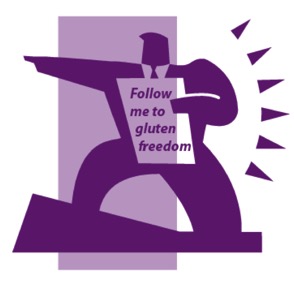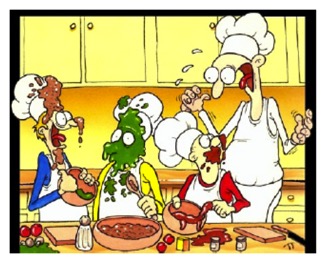Growing Pains of the Gluten-Free Community

Those of you who have been gluten-free for any length of time, think back to when you first went gluten-free. How many people had even heard about gluten/celiac disease/Non Celiac Gluten Sensitivity/gluten-related disorders? Right, not very many. Fast forward to today, we're seeing gluten-free everywhere. So much in fact that it's being called *gasp* "a fad diet". We, the gluten-free community have been wanting mainstream recognition for a long time. It may not be in the exact form we were hoping for, but GF is now mainstream!
Mintel, a global market research firm predicts retail sales of GF foods and beverages to reach $10.5 billion this year and will grow to $15.6 billion by 2016. They also revealed that 75% of consumers [without CD or NCGS] ate gluten-free foods because they thought the foods were healthier. Some 24% of consumers eat or have someone in their household who eats gluten-free foods. It's very clear this market is not being driven only by those with celiac/gluten-sensitivity.
It's also clear that many people are misinformed and some are probably eating gluten-free for all the “wrong” reasons. Most certainly some confusion is being generated by the “gluten-free dabblers” [those that are experimenting]. Yes, there is a bit of turbulence, but we need to control it best we can and ride it out. The current environment may not be optimal, but I think we are seeing “growing pains” as our society comes to grip with gluten and its effects. Things are in a state of flux right now. The packaged food industry, hospitality industry, food service professionals, health care professionals are all trying to figure out how to deal with the gluten-free phenomenon. We know all too well that some are doing better than others at navigating the uncharted gluten-free waters.
As the researchers keep digging, they keep finding more evidence of harm that gluten is inflicting. Americans have shorter life spans and more illnesses than other comparable high-income countries. It's no secret that on average, we are an unhealthy nation. People are sick and tired of feeling sick and tired so they seek out solutions. Some are willing to take matters into their own hands because many of the medical professionals have some catching up to do when it comes to gluten-related disorders.
Let's take a look at this situation in a different way. I think we can all agree that the path to gluten-freedom is a process. We didn't wake up one morning with this all-encompassing knowledge about gluten-free. It took time for us to build our knowledge base. We all had a starting point; we all took our wobbly first steps.
What if this is a dabbler's first step in their journey? After my biopsies came back negative, I decided to do dietary trials, I went off and on gluten several times over three or four months in order to figure out what was going on. Yup, I was a “GF dabbler”. However, once I figured out gluten was an issue for me, it was hasta la vista, baby! It's been over 10 years since gluten has intentionally touched my lips.
Even though people may be misinformed or have a misunderstanding as to why they are trying gluten-free, they may unexpectedly realize relief from other physical ailments. They might have a “light bulb” moment that could be life-altering for them, their children and future generations of their family.
As frustrating as some of our encounters may be, perhaps being supportive is the best role for us to play. While we may never fully understand or know the true intent of those seeking answers by experimentation, don't they deserve the benefit of the doubt? If I hadn't received support before, during and after my trials, things might have turned out differently. What if we are the only supportive people they encounter while doing this?
Those of us that live this 24/7/365 are the ambassadors of the gluten-free lifestyle. It is our responsibility to educate the masses. If not us – who will? For certain this is a Herculean task, but at least it's easier than herding cats.
There are leaders and those who lead. Leaders typically hold a position of power or authority. Those who lead have the ability to inspire without power or authority. We only need to look to Mahatma Gandhi, Martin Luther King, Jr. and Nelson Mandela as perfect examples of those who lead. We may not possess that amount of fame, but that's the beauty of "those who lead" - we don't need it. Each one of us can inspire others simply by leading by example. We chose not to be a victim; not to give up and say "I can't do this gluten-free thing, it's too hard". We chose to be successful. Every time we opt out from an opportunity to cheat, we show others that we take our health and lifestyle seriously. Indeed our actions can speak louder than words.
Every day we can find gluten free teachable moments, they're all around us. A simple and polite "No thank you, I am gluten-zero because the gluten in those donuts make me sick" when the quickie-mart employee asks if we want 3-for-a-dollar donuts as we pay for gasoline. How about a respectful interchange of facts with those that are "gluten-free most of the time". Better yet, invite them to a local support group meeting, so they can really learn what gluten-free is all about. Sharing educational information with your health care team members [doctor, dentist, pharmacist, etc]. Speaking to food service professionals about gluten-free dining options [or lack there of]. Bringing a plate of your killer peanut butter cookies to [anonymously] share at work; specially for that co-worker who turns up their nose at your "icky gluten-free food". Of course, you don't tell anyone they are gluten-free until Mr/Mrs Food Snob proclaims them as "The Best!". Ah sweet justice.
Gluten-free awareness is continuing to grow, but we need everyone's help. In order to raise awareness properly, everyone in the gluten-free community must keep educating, motivating and advocating.
Keep up the great work everyone!
Alan Klapperich - Branch Manager
GIG of East Central Wisconsin
Educating family & friends about gluten-free

Easter is only one week away. In many families, this means Easter Dinner at someone's house other than your own. Oh the humanity...
~~
Not only was today Palm Sunday, but it was also First Communion in our church. The kitchen and fellowship hall was a-buzz with activity.
A family was holding their First Communion celebration in the fellowship hall and everyone was bringing their contributions to the feast: deviled eggs, sliced ham, calico beans, sloppy joes, cakes, pies and desserts of all types. OH MY!
As I was watching all of this food pour in, I'm thinking...OMG what a gluten-free nightmare...
Peg and I were in the kitchen cleaning up from communion, we were invited to take part in celebratory feast. A family member knows I am gluten-free and said "Oh gosh, I'm sorry, we don't have any gluten-free buns, but there's plenty of other things for you...". We politely declined, but really appreciated the heartfelt invitation.
Dining out in a restaurant is hard, but I think eating at someone's house or a hosted event is even harder. Most times the host/hostess are unfamiliar with the gluten-free diet and the concept of cross contamination. Even professionally trained chefs may not always know the ins-and-outs of a gluten-free diet.

I don't blame friends, family and loved ones for not knowing about gluten-free. In fact, it's our [the gluten-free community] responsibility to impart that knowledge to them. If we don't do the education, who will?
In the end, if the people in our lives do not know how to accommodate our needs, we have no one else to blame but ourselves - to a certain degree.
Of course there are some people that just don't get it no matter how hard we try. If we've done our best to educate and it is just not sticking - at least we gave it our best shot. Sometimes family can be the hardest to get through to.
The whole education process doesn't happen overnight. Of course, we have to make allowances [bring our own food, eat before hand, etc] until we are comfortable in their knowledge and abilities. Sadly, in some cases, that day may never come, despite our best efforts.
Since 2003, I've had a lot of "educational opportunities" with our friends and family. They now know and understand cross contamination, they will verify products/ingredients with me, even save the labels for me to inspect. My family and friends have been very good about learning and making things safe for me. I connect with enough of the gluten-free community to know their behavior is not the norm. I am lucky...or...have I simply done a good job at educating them. I suspect it's a little of both.
Even though my family and friends are very good, I always bring at least one dish that I know is safe. Often times, I'll bring a second dish of the same food just for me that won't be put out for the masses. Also, we try to host as many family events as we can so we have as much control as possible.
I'd like to share some of the tools I've used to educate my friends and family members....
BeyondCeliac.org: Seriously, Celiac Disease - This is an effort to educate non-diagnosed family members about the importance of getting tested. As we’ve [often] discussed, our own families can be the most difficult. We talk, we educate, we lead by example. Whatever we do, has no affect. They just don’t listen to us. Celiac disease is genetic, it runs in families. If one person in the family has it, there is a chance someone else in the family has it too (1 in 22 for a mother/father/sibling) - they may not even know it. It’s very possible they could have it, and not have any symptoms at all! Be aware a single negative test does not clear a person for life. Celiac Disease can be triggered at any age - at any time. And so the struggle begins… Family members need to be tested, but getting them to do it is another story. This is where Seriously, Celiac Disease campaign comes in.
Living Gluten Free for Dummies by Danna Korn - I highly recommend this book. I see this book as a continuation or update of her Wheat free Worry Free book. It also goes a bit further in depth on certain subjects. There is no need to own both. Get this one if you don't have either book. Again, a great book to loan out.
Wheat Free Worry Free by Danna Korn - I got this book shortly after I went GF. Danna has a great persona in her books. Her style is very conversational, easy to read and fun! She includes humor in her books, which I think is a great idea. This is a great book to give to friends and loved ones. Often times they have a hard time understanding what you're going thru and why you have to do it. I lent this to my Mom, after that, she seemed to "get it"...or at least stopped questioning why I couldn't have ___________ ;).
A Celiac is Coming For Dinner - This is a nice article from Caryn Taity about accommodating gluten-free guests. I have given this article to several family and friends.
Cooking for Gluten-Free Family or Friends - Amy Leger [aka The Savvy Celiac], covers some of the basics.
Gluten-Free Diet Boot Camp - I often get asked for information on celiac disease and gluten-free. Either it's someone that is just starting to investigate gluten as the source of their health issues, or it's someone that is just newly diagnosed and looking how/where to start. This is a collection of many different links.
A Guide to Gluten Cross Contamination - This guide strictly addresses areas of gluten cross contamination and how to minimize the risk.
A Day in the Life - Living in a Mixed House - This is an article I had written several years ago for this support group. It explains how we handle having gluten in the house. This is knowledge and experience I have gained over the years - much of it I've imparted to friends and family members.
So, You Want to Bake Gluten-Free Cookies - I created this for a few non-gluten-free people that wanted to bake GF cookies. We put together a GF Cookie Baking Kit: This document that included the recipes, the proper amount of GF flour for a specific amount of cookies. I cover the basics of gluten, gluten-free baking and cross contamination - enough information so they can safely make GF cookies for someone. Note: You can tell by the logo, this was done before we became a Gluten Intolerance Group branch in May 2011
Celiac Disease - Stuff you should know, but didn't know to ask - A presentation I did for our church. Since our Pastor is also gluten-free I wanted to educate the other members. This presentation covers the history of celiac disease, what it is, what is gluten, is there a safe amount of gluten, cross contamination. Our church now has a completely gluten-free communion. Since the host is gluten-free so there is no chance of cross contamination. Note: You can tell by the logo, this was done before we became a Gluten Intolerance Group branch in May 2011
Updated:
12/16/16 - Added BeyondCeliac.org's Seriously, Celiac Disease
10/29/13 - Added Gluten-Free Diet Camp.
6/24/2013 - Added Guide to Gluten Cross Contamination.